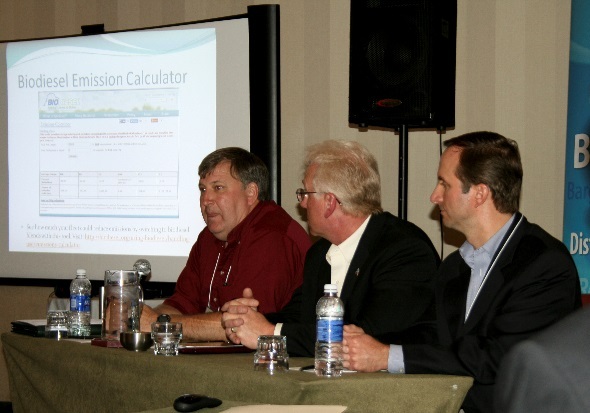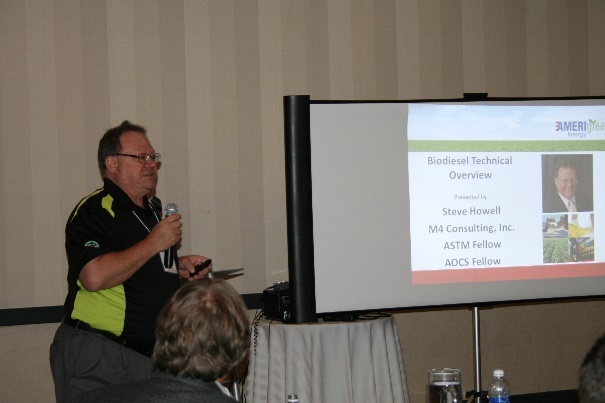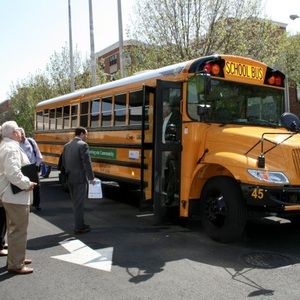'Fleet Footprint' event hosted by Amerigreen Energy this spring




Photo: Amerigreen Energy
June 2, 2016
BY Amerigreen Energy
Amerigreen Energy, in conjunction with Clean Cities of New Jersey and Pennsylvania, hosted “The Fleet Footprint Event: Emissions Requirements and the New Energy Landscape,” in Morristown, New Jersey, this spring. The event presented an honest assessment of all transportation fuels and energy so fuel dealers and their fleet customers can use the information to make smart, cost-effective decisions in order to support new emissions goals.
With so much uncertainty facing the energy industry, change is the only constant. The event represented all alternative fuel technologies taking root in the diesel space.
Attendees learned from and interacted with industry experts and experienced fleet managers. They presented options and first-rate content to incorporate existing equipment to navigate the changes and avoid unexpected costs as they adapt in the face of impending emissions mandates, such as U.S. EPA's greenhouse gas (GHG) emissions reduction requirements. Feedback from attendees and participants was overwhelmingly positive. Plans are being made to extend the program reach to educating additional fleets in the region.
“We hope the event represents a launching point for dealers to continue to grow their relationship with their local market becoming a resource for their customers as they work to comply with emerging emissions standards,” said Steve McCracken, Amerigreen CEO of energy services. “The requirements are coming. Positioning dealers as a local resource and engaging with fleets is the best way to remain ahead of the changes to successfully guide customers through the experience with new equipment and energy. This guidance is key to preserving the composition of local commercial relationships.”
Advertisement
The event started with an alternative fuels overview from the Clean Cities directors of New Jersey and Pennsylvania with an overview of their national and state-specific programs, as well as alternative fuels options available for fleets to reduce dependency on foreign oil and lower emissions.
Steve Howell, NBB senior technical advisor, presented a compelling technical overview of biodiesel. He included a chemical breakdown of the fuel, the history of the ASTM quality specs, importance of food and fuel, and which major vehicle manufacturers have approved their equipment for 20 percent blends of biodiesel (B20). Download his presentation and webinar.
“When you grow a crop of soybeans, that soybean is 80 percent high-protein meal, which feeds humans and animals…and it is 20 percent oil,” Howell said. “That oil was an excess commodity.” As more of this protein is grown throughout the world, the oil will always come as a result. “The more fuel we make, the cheaper food gets,” Howell added. This is different than other fuel types such as ethanol and some of the other alternative fuels. Soybeans are not grown specifically for biodiesel—it comes as a result of growing it for feeding animals and humans.
Advertisement
The program also included two panel discussions from fleet users and managers. First, biodiesel industry leaders presented their experiences in using biodiesel within their own businesses. The audience learned about the benefits and challenges they dealt with when introducing biodiesel to their fleets. When talking to his customers about using biodiesel, Ross Enterprises Vice President of Operations Rob Griscom’s mantra is, “You have to try it. See it for yourself.” He’s such a fan of biodiesel that he uses it for his personal and company vehicles after doing rigorous testing.
On the second panel, propane autogas, CNG and electric vehicle representatives shared their experiences integrating alternative fuels into their own businesses and helping others make the transition. Valuable first-hand lessons were shared to benefit attendees as they consider alternative fuel options.
The event, held April 21, concluded with an alternative energy vehicles expo. On display were a biodiesel-powered school bus, biodiesel Jeep, propane autogas bi-fuel truck, and electric cars. Attendees could kick the tires, talk with vehicle owners, and see first-hand the alternative energy technologies currently available.
See the full event recap and presentations here: http://www.amerigreen.com/fleet-footprint-event-recap/.
Related Stories
The Missouri Agricultural and Small Business Development Authority (MASBDA) announced it has invested nearly $3.4 million in projects that increase the distribution and use of higher blends of ethanol and biodiesel in the State of Missouri.
SK Energy has successfully exported sustainable aviation fuel (SAF) to Europe, marking a first for a Korean refiner. This milestone comes just four months after the company commenced commercial production, completing a global value chain for SAF.
Tidewater Renewables Ltd. has filed a countervailing (anti-subsidy) and anti-dumping duty complaint with the Canada Border Services Agency. The complaint targets unfairly traded imports of renewable diesel from the U.S.
USDA announces appointments to the Greenhouse Gas Technical Assistance Provider and Third-Party Verifier Program Advisory Council
The USDA has appointed 36 members to serve on the newly formed Greenhouse Gas Technical Assistance Provider and Third-Party Verifier Program Advisory Council, informally known as the Growing Climate Solutions Act Advisory Council.
The U.K.’s sustainable aviation fuel (SAF) mandate officially came into force on Jan. 1. By law, SAF must now account for at least 2% of all jet fuel in flights taking off from the U.K. The mandate is set to expand to 10% in 2030 and 22% in 2040.
Upcoming Events










